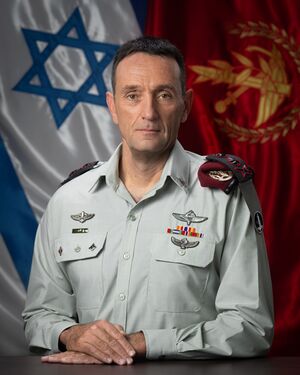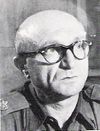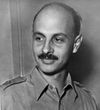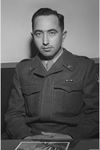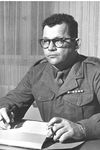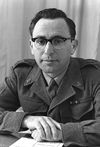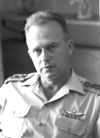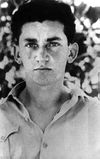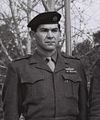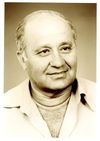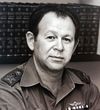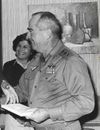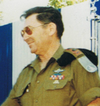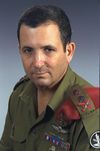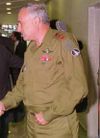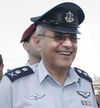رئيس الأركان الإسرائيلي
| Chief the General Staff
ראש המטה הכללי | |
|---|---|
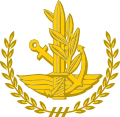 | |
 Flag of the Chief of the General Staff | |
| Ministry of Defense | |
| الاختصار | Ramatkal |
| عضو | General Staff |
| يرأسه | Minister of Defense |
| المقعد | Rabin Camp, HaKirya, Tel Aviv |
| المرشـِّح | Minister of Defense |
| المعيـِّن | Cabinet of Israel |
| طول المدة | 3 years; renewable |
| التشكل | 1 يونيو 1947 |
| أول شاغل | Rav Aluf Yaakov Dori |
| النائب | Deputy chief of the general staff |
رئيس الأركان الإسرائيلي (بالعبرية: ראש המטה הכללי, Rosh HaMateh HaKlali، واختصارها: Ramatkal—רמטכ"ל)، هو القائد الأعلى ورئيس أركان جيش الدفاع الإسرائيلي. ويكون رئيس الدفاع ضابط إسرائيلي برتبة رڤ ألوف. وهي من أعلى الرتب في جيش الدفاع ، وتكافئ رتبة (بالعبرية: רב-אלוף) (جنرال) في الجيوش الغربية.
At any given time, the Chief of the General Staff is the only active officer holding the IDF's highest rank, rav aluf (רַב־אַלּוּף), which is usually translated into English as lieutenant general, a three-star rank. The only exception to this rule occurred during the Yom Kippur War, when former Chief of the General Staff Haim Bar-Lev, who was a cabinet member at the outbreak of and during the war, was brought out of retirement and installed as chief of Southern Command.[1] For a brief period, he and Chief of the General Staff David Elazar were both in active service with the rank of rav aluf.
التاريخ
The role of the Chief of the General Staff began with the Haganah organization, where it was named after the head of the general staff of the Haganah. With the establishment of the IDF, the Chief of Defense and the Chief of Staff, headed by Yaakov Dori, were converted to head the IDF.[2]
The chief of the general staff is officially appointed for a three-year term, which can be extended for another year. An exception was Rafael Eitan, whose term was extended twice, and he served a total of five years.[3] On the other hand, there were several chiefs of staff who did not complete their full term: Yigal Yadin resigned amid disagreements over the IDF budget,[4] Mordechai Maklef served for only one year at his request,[5] David Elazar was forced to resign following the recommendations of the Agranat Commission investigating the Yom Kippur War,[6] and Dan Halutz resigned due to criticism of the Second Lebanon War.[7] Also, two chiefs of staff have given up part of their tenure extension: Amnon Lipkin-Shahak wanted to end his term in the middle of the fourth year, due to his desire to move into politics and run for prime minister. Haim Laskov asked not to serve a fourth year due to his disagreements with Shimon Peres.[بحاجة لمصدر]
In 2005, Ariel Sharon and Shaul Mofaz did not extend Moshe Ya'alon's term to a fourth year,[8] during which he was interpreted as a dismissal in light of Ya'alon's opposition to the disengagement plan. In order to prevent such problems in the future, and as was done for other positions such as that of the President of the State, Defense Minister Amir Peretz appointed Major General Gabi Ashkenazi in 2007 for a period of four years, thus removing the uncertainty regarding the addition of the fourth year. Ashkenazi raised the issue of extending his term to a fifth year.[9]
At the end of his term, the Chief of the General Staff (like other senior members of the Israeli defense establishment) has a cooling-off period of three years before he can be elected a Member of the Knesset, be appointed a Minister in the Government or be elected Prime Minister.[بحاجة لمصدر]
المنصب القانوني
The position of ramatkal is defined in the Basic Law: The Military (1976), clause three:[10]
- The supreme command rank in the military is that of the Chief of the General Staff
- The Chief of the General Staff is to be placed under the authority of the government and subordinate to the Defense Minister
- The Chief of the General Staff is to be appointed by the government, according to the recommendation of the Defense Minister
The Chief of the General Staff is formally appointed once every three years, with the government often extending the term to four years, and in one occasion, even five.
الأهمية
Given the importance of the IDF in Israeli society, the Chief of the General Staff is an important public figure in Israel. On appointment of a new Chief of the General Staff, mass-circulation papers such as Yedioth Ahronoth and Israel Hayom customarily provide their readers with large-scale portrait photos of the new Chief. Former Chiefs of the General Staff often parlay the prominence of their position into political life, and sometimes the business world.[بحاجة لمصدر] Two Chiefs of the General Staff (Yitzhak Rabin and Ehud Barak) have become Prime Minister of Israel[11][12] and eleven others (Yigael Yadin, Moshe Dayan, Tzvi Tzur, Haim Bar-Lev, Mordechai Gur, Rafael Eitan, Amnon Lipkin-Shahak, Shaul Mofaz, Moshe Ya'alon, Gabi Ashkenazi, and Benny Gantz) have served in the Knesset.[13] Of these, only Tzur did not get appointed to the Cabinet.
Six former Chiefs of the General Staff (Dayan, Rabin, Barak, Mofaz, Ya'alon, and Gantz) held the position of Defense Minister, widely considered to be one of the most powerful ministerial posts in the country and the immediate civilian superior of the Chief of the General Staff.[بحاجة لمصدر] Moshe Dayan served also as Foreign Minister. Soon after his discharge, Dan Halutz became the CEO of a car importer.[14] Ehud Barak took a hiatus from politics twice after defeats for re-election and pursued international business ventures.[بحاجة لمصدر]
قائمة رؤساء أركان جيش الدفاع الإسرائيلي
| № | Chief of Staff | Took office | Left office | Time in office | ||
|---|---|---|---|---|---|---|
| 1 | Rav Aluf Yaakov Dori (1899–1973) | 1 June 1947 | 9 November 1949 | 2 years, 161 days | ||
| 2 | Rav Aluf Yigael Yadin (1917–1984) | 9 November 1949 | 7 December 1952 | 3 years, 28 days | ||
| 3 | Rav Aluf Mordechai Maklef (1920–1978) | 7 December 1952 | 6 December 1953 | 364 days | ||
| 4 | Rav Aluf Moshe Dayan (1915–1981) | 6 December 1953 | 29 January 1958 | 4 years, 54 days | ||
| 5 | Rav Aluf Haim Laskov (1919–1982) | 29 January 1958 | 1 January 1961 | 2 years, 338 days | ||
| 6 | Rav Aluf Tzvi Tzur (1923–2004) | 1 January 1961 | 1 January 1964 | 3 years, 0 day | ||
| 7 | Rav Aluf Yitzhak Rabin (1922–1995) | 1 January 1964 | 1 January 1968 | 4 years, 0 day | ||
| 8 | Rav Aluf Haim Bar-Lev (1924–1994) | 1 January 1968 | 1 January 1972 | 4 years, 0 day | ||
| 9 | Rav Aluf David Elazar (1925–1976) | 1 January 1972 | 3 April 1974 | 2 years, 92 days | ||
| - | Aluf Yitzhak Hofi (Acting) (1927–2014) | 3 April 1974 | 16 April 1974 | 13 days | ||
| 10 | Rav Aluf Mordechai Gur (1930–1995) | 16 April 1974 | 16 April 1978 | 4 years, 0 day | ||
| 11 | Rav Aluf Rafael Eitan (1929–2004) | 16 April 1978 | 19 April 1983 | 5 years, 3 days | ||
| 12 | Rav Aluf Moshe Levi (1936–2008) | 19 April 1983 | 19 April 1987 | 4 years, 0 day | ||
| 13 | Rav Aluf Dan Shomron (1937–2008) | 19 April 1987 | 1 April 1991 | 3 years, 347 days | ||
| 14 | Rav Aluf Ehud Barak (born 1942) | 1 April 1991 | 1 January 1995 | 3 years, 275 days | ||
| 15 | Rav Aluf Amnon Lipkin-Shahak (1944–2012) | 1 January 1995 | 9 يوليو 1998 | 3 years, 189 days | ||
| 16 | Rav Aluf Shaul Mofaz (born 1948) | 9 يوليو 1998 | 9 يوليو 2002 | 4 years, 0 day | ||
| 17 | Rav Aluf Moshe Ya'alon (born 1950) | 9 يوليو 2002 | 1 June 2005 | 2 years, 327 days | ||
| 18 | Rav Aluf Dan Halutz (born 1948) | 1 June 2005 | 14 فبراير 2007 | 1 years, 258 days | ||
| 19 | Rav Aluf Gabi Ashkenazi (born 1954) | 14 فبراير 2007 | 14 فبراير 2011 | 4 years, 0 day | ||
| 20 | Rav Aluf Benny Gantz (born 1959) | 14 فبراير 2011 | 16 فبراير 2015 | 4 years, 2 days | ||
| 21 | گادي آيزنكوت (born 1960) | 16 فبراير 2015 | 15 يناير 2019 | 3 years, 333 days | [15][16] | |
| 22 | أڤيڤ كوخاڤي (born 1964) | 15 January 2019 | 16 January 2023 | 4 years, 1 days | [17] | |
| 23 | هرتسي هالڤي (born 1967) | 16 January 2023 | Incumbent | 2 years, 77 days | [18] |
خط زمني

الهامش
- ^ "Lt. Gen. Chaim Bar Lev (1968-1972)". www.idf.il. Archived from the original on 8 June 2022. Retrieved 2021-04-01.
- ^ "Lt. Gen. Yaacov Dori (1948-1949)". Israel Defense Forces. Archived from the original on 8 June 2022. Retrieved 2021-04-01.
- ^ "Cabinet Extends Eitan's Item; Appoints Mandelbaum As the Governor of the Bank of Israel". Jewish Telegraphic Agency (in الإنجليزية الأمريكية). 1982-01-04. Archived from the original on 9 October 2023. Retrieved 2021-04-01.
- ^ "Lt. Gen. Yigal Yadin (1949-1952)". Israel Defense Forces. Archived from the original on 8 June 2022. Retrieved 2021-04-01.
- ^ "Lt. Gen. Mordechai Maklef (1952-1953)". Israel Defense Forces. Archived from the original on 2021-12-24. Retrieved 2021-04-01.
- ^ "Lt. Gen. David Elazar (1972-1974)". Israel Defense Forces. Archived from the original on 2020-02-02. Retrieved 2021-04-01.
- ^ Greenberg, Hanan (2007-01-16). "IDF Chief Halutz resigns". Ynetnews (in الإنجليزية). Archived from the original on 2007-01-18. Retrieved 2021-04-01.
- ^ Greenberg, Hanan (2005-02-15). "Mofaz ends Chief of Staff's tenure". Ynetnews (in الإنجليزية). Archived from the original on 2 July 2022. Retrieved 2021-04-01.
- ^ Ginsburg, Mitch (2012-03-04). "Timeline of a high-ranking feud". The Times of Israel (in الإنجليزية الأمريكية). Archived from the original on 2012-03-06. Retrieved 2021-09-17.
- ^ "Basic Law: The Military". Knesset. Archived from the original on 2003-04-23. Retrieved 2021-04-01.
- ^ "Lt. Gen. Yitzhak Rabin (1964-1968)". Israel Defence Forces. Archived from the original on 18 April 2021. Retrieved 2021-04-01.
- ^ "Lt. Gen. Ehud Barak (1991-1995)". Israel Defence Forces. Archived from the original on 2020-08-13. Retrieved 2021-04-01.
- ^ Keinon, Herb (6 August 2020). "The virtues and pitfalls of former IDF chiefs of staff entering politics". The Jerusalem Post (in الإنجليزية الأمريكية). Archived from the original on 2020-08-07. Retrieved 2021-04-01.
- ^ Hazani, Golan (2007-10-10). "Dan Halutz named CEO of Kamor Motors". Ynetnews (in الإنجليزية). Archived from the original on 2007-10-12. Retrieved 2021-04-01.
- ^ خطأ استشهاد: وسم
<ref>غير صحيح؛ لا نص تم توفيره للمراجع المسماةpast-chiefs - ^ Ginsburg, Mitch. "Maj. Gen. Gadi Eizenkot to be named 21st commander of IDF". The Times of Israel. Archived from the original on 27 January 2019. Retrieved 28 November 2014.
- ^ "Outgoing IDF Chief of Staff Gadi Eisenkot - A look back". The Jerusalem Post (in الإنجليزية الأمريكية). 11 January 2019. Archived from the original on 4 February 2021. Retrieved 2021-04-01.
- ^ Fabian, Emanuel (16 January 2023). "Herzi Halevi formally takes over as chief of staff, vows to keep politics out of IDF". The Times of Israel (in الإنجليزية الأمريكية). Archived from the original on 10 June 2023. Retrieved 2023-10-08.
- صفحات تستخدم خطا زمنيا
- CS1 الإنجليزية الأمريكية-language sources (en-us)
- Short description with empty Wikidata description
- Articles containing عبرية-language text
- مقالات ذات عبارات بحاجة لمصادر
- رؤساء أركان القوات المسلحة الإسرائيلية
- رتب جيش الدفاع الإسرائيلي
- رؤساء أركان إسرائيليون
- Israeli generals
- Chiefs of defence
- Commanders in chief
